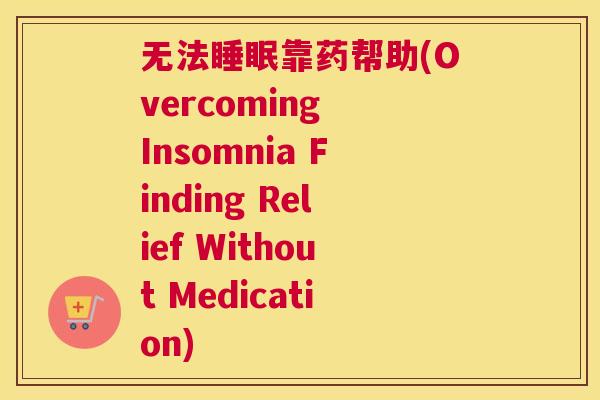无法睡眠靠药帮助(Overcoming Insomnia Finding Relief Without Medication)
Introduction: Understanding Insomnia
Insomnia is a prevalent sleep disorder characterized by difficulty falling asleep, staying asleep, or experiencing non-restorative sleep. It can significantly impact one's quality of life, leading to daytime fatigue, mood disturbances, and impaired cognitive function. While medication is commonly used to manage insomnia, there are alternative approaches to finding relief without relying on drugs.
Establishing Healthy Sleep Habits
One effective way to overcome insomnia is by establishing healthy sleep habits, also known as sleep hygiene. This involves maintaining a consistent sleep schedule by going to bed and waking up at the same time every day, even on weekends. Additionally, creating a relaxing bedtime routine can signal to the body that it's time to wind down and prepare for sleep.
Creating a Restful Sleep Environment
The environment in which you sleep plays a crucial role in the quality of your sleep. Make your bedroom conducive to sleep by keeping it cool, dark, and quiet. Invest in a comfortable mattress and pillows, and consider using white noise machines or earplugs to block out any disruptive sounds. Limit the use of electronic devices before bedtime, as the blue light emitted can interfere with your body's natural sleep-wake cycle.

Managing Stress and Anxiety
Stress and anxiety are common contributors to insomnia. Learning effective stress management techniques, such as mindfulness meditation, deep breathing exercises, or progressive muscle relaxation, can help calm the mind and promote better sleep. It's also essential to address any underlying issues causing stress or anxiety, whether through therapy, counseling, or lifestyle changes.
Limiting Stimulants and Improving Diet
Consuming stimulants such as caffeine, nicotine, and alcohol close to bedtime can disrupt sleep patterns. Limiting the intake of these substances, especially in the hours leading up to bedtime, can improve sleep quality. Additionally, maintaining a balanced diet and avoiding heavy or spicy meals before bed can help prevent discomfort and indigestion that may interfere with sleep.
Incorporating Regular Exercise
Regular physical activity has been shown to promote better sleep by reducing stress and anxiety, regulating mood, and promoting relaxation. Aim for at least 30 minutes of moderate exercise most days of the week, but be mindful of timing. Exercising too close to bedtime may have stimulating effects, so it's best to schedule workouts earlier in the day.
Seeking Professional Help
If insomnia persists despite implementing these strategies, it may be beneficial to seek professional help. A healthcare provider or sleep specialist can evaluate your sleep patterns, identify underlying causes of insomnia, and recommend appropriate treatments or therapies. This may include cognitive-behavioral therapy for insomnia (CBT-I), which has been shown to be highly effective in treating chronic insomnia without the use of medication.
Conclusion: Finding Relief Without Medication
While medication can be a temporary solution for managing insomnia, it's essential to explore alternative approaches that address the root causes of sleep disturbances. By prioritizing healthy sleep habits, creating a restful sleep environment, managing stress and anxiety, limiting stimulants, incorporating regular exercise, and seeking professional help when needed, you can overcome insomnia and enjoy restful, rejuvenating sleep without relying on medication.






